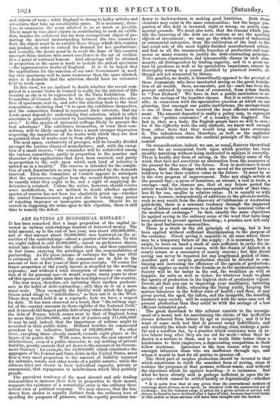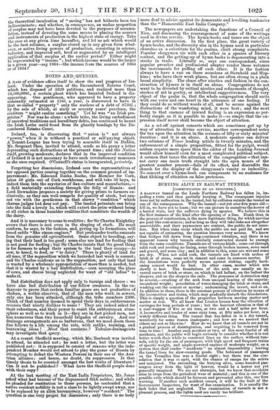ARE SAVINGS AN ECONOMICAL MISTAKE?
IT has been remarked that a large proportion of the capital in- vested in railway undertakings consists of borrowed money. The total amount, up to the end of last year, was about 280,000,0001., and of that amount about 70,000,000/. was borrowed on the se- curities of the undertakings—about a quarter of the whole. To this we ought indeed to add 42,000,0001., raised on preference shares, which take dividends before the other shares and thus constitute in fact loans, carrying the privileges and the responsibilities of partnership. As the gross income of railways for the year 1853 is estimated at 18,000,0001., the companies are in debt to the amount of four or five years of their gross receipts. Of course the larger proportion of the yearly income is absorbed by the working expenses ; and without a total absorption of income—an extinc- tion of it for personal use—it would require many years to clear off this species of public debt upon the iron highways of the country. The iron ways, therefore, are imitating their earthen predeces- sors in the habit of debt-contracting ; only they do it on a more royal scale. They exemplify the fidelity with which the Anglo- Saxon mind clings to "indebtedness," as they call it in the West. There they would hold it as a reproach; here we have a respect for debt. It has been observed as a boast, that "the railway capi- tal of the country amounts to three-eighths of the National Debt," and it exceeds the largest public debt of any other state but our own ; the debt of France, which comes next to that of England, being no more than 233,000,000/., and that of Austria only 211,000,000/. It may be said, indeed, that the importance of nations might be measured in their public debts. Holland testifies its commercial grandeur by its collective liability of 100,000,000/. No other state, excepting those already named, exceeds eight places in the figure of its public debt. With some, however, the real amount of indebtedness, even of a public character, to say nothing of private liability, greatly exceeds that set down to the account of its Govern- ment treasury : for example, the 43,000,000/. which constitutes the aggregate of the Federal and State debts in the -United States, must bear a very small proportion to the amount of liability incurred for railways, canals, and other works of a public nature ; while the citizens have not shown in their individual capacity, private or commercial, that repugnance to indebtedness which they publicly parade. The prevalent tendency of the most shrewd and safe trading communities to increase their debt in proportion to their means, suggests the existence of a remarkable error in the ordinary theo- retical view of political economy. We may observe, that the ten- dency. here shown is equally distinct from the ordinary love of spending for purposes of pleasure, and the equally prevalent ten-
dency to backwardness in making good liabilities. Both those elements may exist in the same communities; but the larger pro- portion of this debt is incurred, right or wrong; on purely com- mercial grounds. We must also note, that the reasons which jus- tify the incurring of the debt are as various as are the material objects of investment : we may go the whole round of industrial or commercial enterprise, from the cultivation of the land to the last retail sale of the most highly-finished manufactured article, and find in all the innumerable branches of production and com- merce as many reasons to justify the debt-contracting principle. Now various communities, and innumerable classes in each com- munity, all distinguished by trading sagacity:, and to a great ex- tent by prudence as well as by speculative impatience, cannot be thoroughly wrong in a course justified by practical results, al- though not yet warranted by theory.
The practice, no doubt, is diametrically opposed to the precept of those economists who have inculcated saving as the great founda- tion of all wealth. Save, accumulate, put by—such has been the precept enforced by every class of economist, from Adam Smith to "Poor Richard." We have in fact a public institution to re- ceive the savings of the humbler classes. But it is rather remark-, able, in connexion with the.speculative question at which we are glancing, that amongst our public institutions, fr.he savings-bank is one of those that have received the least efficient encourage- ment. The amount deposited is really a paltry sum, to represent even the " petites economies" of a country like England. The fact is' that, as a body, the English people have no will to save ; for if the difficulty were the only obstacle, we know well enough from other facts that they would long since have overcome it. The industrious class, therefore, as well as the capitalist class, practically contemns the cardinal principle of the rigid eco- nomist.
On reconsideration, indeed, we can, as usual, discover theoretical reasons for an economical truth upon which practice has been steadily marching without being instructed to ana13-ze it correctly. There is hardly any form of saving, in the ordinary sense of the word, that does not constitute an abstraction from the resources of the present for the uses of the future. Now in most cases it must happen, that those things which are saved at the present have a tendency to lose their relative value in the future. It must be so in the very progress of improvement. Take any single article at the present day—a piece of furniture, an utensil, a tool in trade, a carriage—and the chances are, that at any future .period the article would be inferior to the correspondin article of that time, less fit for use, smaller in relative value. It. is equally so with money ; because, independently of additions tathe-Trecious metals, such as may result from the discovery of Californian or Australian gold-fields, there is a constant tendency through the improved value of labour and commerce to a,decline in the nominal value of the medium of exchange.* In fact, exactly the same -objections lie against saving in the ordinary sense of the word that have long been allowed to prevail against hoarding.; a practice now left only to the most barbarous communities.
There is a truth in the old principle of saving, but it has been applied without sufficient discrimination to the purpose of the economy. Direct saving is requisite in all cases where there may be a temporary failure of the supply: it is necessary, for ex- ample, to have on hand a stook of corn sufficient to cover the in- terval between season and season, with the chance of failure in a scanty season or a succession of scanty seasons : but this direct saving can never be required for any lengthened period of time. Another part of surplus production should be devoted to con- tinuing and increasing the efficiency of the agontsdof production; and this applies as much to the human as to the mechanical agents. Society will be far better in the end, .far wealthier as well as happier, far safer as well as richer, for whatever tends to place the agents of production in the highest state of productive vigour. Devote all that you can to improving your machinery, bettering the state of your fields, educating the rising youth, keeping the mature labourers in the fullest state of health ; and then, at any given period, the aged, the infirm, and the incapable, the standing burdens upon society, will be supported with far more ease out of Present production than they could be with the savings of a less efficient industrial past.
The great drawback to this reliance consists in the arrange- ment of a moral test for ascertaining the elainas of the imffective , classes debarred from labour by age or incapacity; and it is for want of some such test that at present many individuals, and and virtually the whole body of the working class, undergo a pain- ful and a needless tax, by a practice which continues men in ac- tive labour long after they are too old for work--when their in-' dustry is a torture to them, and is in truth little -better than a hinderance to their employers, it depreciating competition to their fellow workman. Ignorance is the true reason why . we keep amongst labourers those who are inefficient through age, and whom it would be best for all parties to pension off.
The third part of surplus production should be devoted to that which constitutes in truth the soundest form of saving, since it realizes the purposes of that process; without waste, and without ' the objections which lie against hoarding : it is insurance. But ' what we have already said is perhaps sufficient, to lOppn the in- quiry—which cannot be settledIastlly or dogmatically-.-whether • It is quite true that at any given 'time the conventional medium of exchange must always, so to speak, be identical with the commercial par of exchange ; but the common range of prices for a given article or service will always be found to have declined after a lapse of time because improved forms of that article or (hose services will have been brought into the market.
the theoretical inculcation of " saving " has not hitherto been too indiscriminate ; and whether, in consequence, an undue proportion of surplus may not have been devoted to the purposes of accumu- lation, instead of devoting the same means to placing the sources and instruments of production in the highest state of energy. Take the case at any given time hereafter, and let us ask which would be the best reliance, a surplus stored up in any given form what- ever, or active living powers of production, consisting in science, industry, and improved soil, bred or augmented by an intelligent application of that surplus at the earlier period? Either might be represented by " income " ; but which income would be the larger in a given year—Say 1864—the income from the sources of 1864 or of 1854?

























 Previous page
Previous page